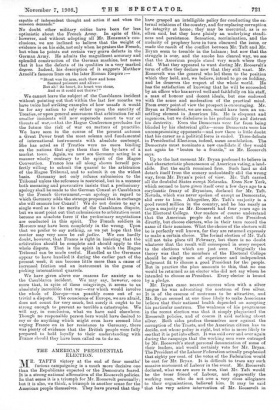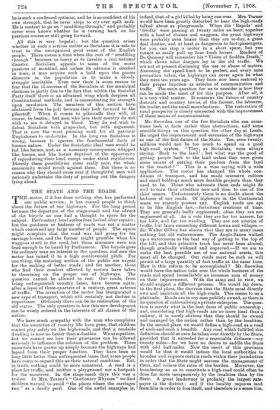THE AMERICAN PRESIDENTIAL ELECTION.
MR. TAFT'S victory at the end of four months' furious campaigning is a much more • decisive one than the Republicans expected or the Democrats feared. It is a strong national affirmation of the Roosevelt policies. In that sense it is a triumph for Mr. Roosevelt personally; but it is also, we think, a triumph in another sense for the American people themselves. They have proved that they
have grasped an intelligible policy for conducting the ex- ternal relations of the country, and for replacing corruption have grasped an intelligible policy for conducting the ex- ternal relations of the country, and for replacing corruption
by integrity at home ; they may be mercurial, as is so often said, but they have plainly an underlying steadi- ness and persistence. Sensation, recrimination, and the audacity of prophecy have in turn obscured the issue, or made the result of the conflict between Mr. Taft and Mr. Bryan seem to tremble in the balance; but now that the struggle is over, and the smoke has cleared way, we see that the American people stand very much where they did. What they appeared to want during Mr. Roosevelt's term of office they declare now that they still want. Mr. Roosevelt was the general who led them to the position which they hold, and, we believe, intend to go on holding, and he deserves the respect of the whole world. He has the satisfaction of knowing that he will be succeeded. by an officer who has served well and faithfully on his staff, a man of honour and decent ideals, but one endowed with the sense and moderation of the practical mind. From every point of view the prospect is encouraging. Mr. Bryan as President, we are sure, would have been an un- settling element in American life. He is eloquent and ingenious, but we disbelieve in his profundity and distrust his dexterity. Even the Democrats were far from being blinded by his rhetorical gifts—some Democrats were his uncompromising opponents—and now there is little doubt that his career as a political force is ended. Three defeats in Presidential Elections, indeed, mean annihilation. The Democrats must nominate a new candidate if they would not again be " beaten to a frazzle," as Mr. Roosevelt says.
Up to the last moment Mr. Bryan professed to believe in that characteristic phenomenon of American voting, a land- slide. But the earth remained firm. Such land as did detach itself from the scenery undoubtedly slid the wrong way, from Mr. Bryan's point of view. Mr. Taft carried all the doubtful States except Nebraska. Even New York, which seemed to have given itself over a few days ago to a corybantic frenzy of Bryanism, declared for Mr. Taft. Nevada, which was never spoken of except as Democratic, slid over to him. Altogether, Mr. Taft's majority is a good round million in the country, and he has nearly as large a majority as Mr. Roosevelt had four years ago in the Electoral College. Our readers of course understand that the American people do not elect the President directly, but choose electors, who in their turn record the name of their nominee. What the choice of the electors will be is perfectly well known, for they are returned expressly to make a certain choice. The formal election of Mr. Taft will not take place till February, but there is no doubt whatever that the result will correspond in every respect to the elections which are just over. Originally the theory was that the members of the Electoral College should be simply men of experience and independent judgment fit to choose a good President for the people. But in practice the plan amounts to this, that no one would be returned as an elector who did not say whom lie intended to choose as President. Every elector is bound by a pledge.
Mr. Bryan came nearest success when with a silver tongue he was advocating the nostrum of free silver. It is of the essence of nostrums to be attractive, and Mr. Bryan seemed at one time likely to make Americans believe that their national health depended on accepting .his particular nostrum. The weakness of his programme in the recent election was that it simply plagiarised the Roosevelt policies, and of course it said nothing about silver. Both sides profess themselves now against the corruption of the Trusts, and the American citizen has to decide, not whose policy is right, but who is more likely to see that it is put into effect. It was said over and over again during the campaign that the working men were outraged by Mr. Roosevelt's stout personal denunciation of some of their leaders, and would certainly vote for Mr. Bryan. The President of the Labour Federation actually prophesied that eighty per cent. of the votes of the Federation would be cast for Mr. Bryan. It is difficult to trace any such massive movement of Labour in the event. Mr. Roosevelt declared, what we are sure is true, that Mr. Taft would be the truer friend of Labour, and apparently the working men, who do not owe a very close allegia.nce to their organisations, believed him. It may be said that the very active intervention of Mr. Roosevelt in he is such a confirmed optimist, and he is so confident of his own strength, that he never stops to cry over spilt milk. He is content to go on " muddling through," and probably never even knows whether he is turning back on his previous course or still going forward.
All this is very hopeful ; but the question arises whether in such a serious matter as Socialism it is safe to trust to the unorganised good sense of the English people. There comes a time when the cost of " muddling through " becomes so heavy as to involve a real national disaster. Socialism appeals to some of the worst passions of mankind, and unless its advance is checked in time, it may acquire such a hold upon the poorer elements iu the population as to make a bloody struggle inevitable. Even now there is some reason to fear that the ill-success of the Socialists at the municipal elections is partly due to the fact that within the Socialist Party itself there is an advanced wing which despises all Constitutional methods, and is concentrating its strength upon revolution. The members of this section have abstained from the poll because they look forward to the pikestaff. When it comes to pikestaffs they will, of course, be beaten; but men who love their country do not wish to see it deluged in blood. They do not wish to defeat Socialism with grape-shot, but with argument. That is now the most pressing work for all patriotic Englishmen to undertake. In the long run Socialism is wrong, because it ignores the fundamental facts of human nature. Under the Socialistic ideal men would be fed like horses, and, as a necessary consequence, whipped like horses, and like horses deprived of the opportunity of reproducing their kind except under strict regulations. Directly these possibilities came really near, the whole community would revolt against them. But there is no reason why they should come near if thoughtful men will seriously undertake the duty of pointing out the dangers lying ahead.





























































 Previous page
Previous page